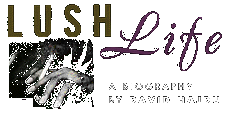
The Maestro, Mr. Hajdu makes clear, was delighted to promote Strayhorn's name whenever he could - he generally announced the younger man's name when performing his work and even produced an album by Strayhorn in 1965 - as long as it took nothing away from himself. When Strayhorn got outside offers (a phone call from Frank Sinatra, for instance), Ellington would pull strings to make sure he couldn't accept. Strayhorn worked most extensively outside the Duke's realm in the early '50s, when the band was in a general decline and many of its stars had temporarily left. His full-time return to the fold provided was a key factor in Ellington's 1956 comeback, at which point Strayhorn's name began, for a time, appearing above the title alongside Ellington's, most notably in their 1960 treatment of The Nutcracker Suite .
Lush Life documents that throughout Strayhorn's short life, his anonymity served as the defining factor in the relationship of the two men. Strayhorn was officially employed by the maestro's publishing company, Tempo Music, but never signed a contract or received a regular salary: rather, his rent, food, clothes, travel and increasingly-exorbitant bar bills were simply taken care of by Ellington. The Maestro never even set a quota on the amount of output he expected from Strayhorn, who was the only composer-arranger besides himself whose work he featured regularly.
Yet the desire to express oneself in music, whether as writer or performer, often goes hand in hand with the need to shout one's name from the mountaintops. Denied the gratification that should have come from the recognition of his talent, Strayhorn's sole satisfaction came from his "Lush Life." This was, unfortunately, not merely the title of his most famous ballad; it also represented the excessive smoking and drinking which led to his death from esophagal cancer at 51.
What makes Lush Life one of the finest jazz biographies is the fashion in Mr. Hajdu avoids underlining any of this but directs the reader to these conclusions through the weight of his evidence, including the copious testimony of nearly 200 Strayhorn and Ellington associates. The detail that Mr. Hajdu has uncovered, particularly concerning the early Pittsburgh years, is remarkable.
Ellington, writing of Strayhorn several years after his partner's death (and not long before his own, in 1974), stated, "I only hope that my representation of him will have the dignity with which he represented me." After the almost 30 years since Strayhorn's passing, this seminal figure in American music (said Gil Evans, "All I ever tried to do was what Billy Strayhorn did") has finally found the "representation" he deserves.